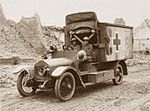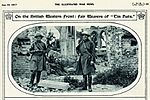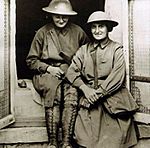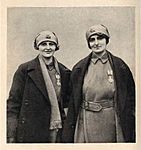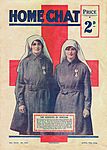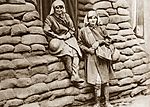Mairi Chisholm facts for kids
Quick facts for kids
Mairi Chisholm
|
|
|---|---|
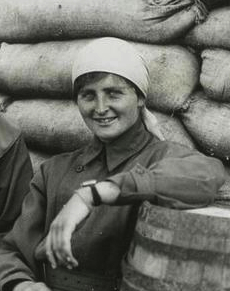 |
|
| Born |
Mairi Lambert Gooden Chisholm
26 February 1896 Datchet, England
|
| Died | 22 August 1981 (aged 85) Perth, Scotland
|
| Years active | 1914–1918 |
| Medical career | |
| Profession | Nurse |
| Awards |
|
Mairi Chisholm (born February 26, 1896 – died August 22, 1981) was a brave Scottish nurse and ambulance driver. She served during the First World War. Mairi, along with her friend Elsie Knocker, saved many soldiers' lives. They worked on the Western Front in Belgium. The newspapers called them "The Madonnas of Pervyse." They were among the most famous women of the war.
Contents
Early Life and Adventures
Mairi Chisholm was born in Buckinghamshire, England, in 1896. Her family was quite rich and owned a farm in Trinidad. When Mairi was a teenager, she watched her older brother race motorcycles. She loved motorcycles too.
Her father bought her a Douglas motorbike, even though her mother did not want him to. Mairi spent hours taking apart and fixing motorbikes. When she was 18, she met Elsie Knocker. Elsie was 30, divorced, and had a young son. They quickly became good friends. They even raced motorcycles and sidecars together.
Helping in World War I
When World War I started in 1914, Elsie Knocker wrote to Mairi. She said there was "work to be done." They decided to go to London to become dispatch riders. These riders delivered messages on motorbikes for the Women's Emergency Corps. Mairi rode her motorbike all the way from Dorset to London.
While working as a courier, a doctor named Hector Munro noticed Mairi. He was starting a Flying Ambulance Corps to help the Belgian people. The Belgians were surprised by the German invasion. Dr. Munro asked Mairi to join his team. She said yes right away.
Working on the Front Lines
Mairi and Elsie went to Belgium as part of the ambulance corps. At first, they were in Ghent. Later, they moved to Veurne. They worked very hard, picking up wounded soldiers from the front lines. They took them to a hospital further back. Soon, there were too many wounded soldiers. They lay on the floor or leaned against walls. Mairi wrote in her diary about seeing many dead and badly hurt men.
Mairi and Elsie soon realized they could save more lives. They thought they could help soldiers right on the front lines. In November, they left the corps. They set up their own dressing station in a town called Pervijze. This was only about 100 yards from the trenches.
The "British First Aid Post"
They used an empty cellar as their "British First Aid Post." For the next three and a half years, they treated wounded soldiers there. They were no longer part of the Belgian Red Cross. This meant they had to find their own money to keep working. Elsie managed to get them officially linked to the Belgian army in Pervijze.
In January 1915, King Albert I of Belgium gave them both medals. They received the Order of Léopold II for their brave work. They also received the British Military Medal. Both were made Officers of the Most Venerable Order of St. John of Jerusalem. Mairi also got the Belgian Queen Elisabeth Medal and other British war medals.
Challenges and Return Home
In 1916, Mairi got engaged to a pilot named Jack Petrie. Sadly, he died a year later during flying practice. In 1918, Mairi and Elsie were badly hurt. Their hospital was hit by bombs and gas attacks. Mairi recovered enough to go back to the front. But she had to leave her post a few months before the war ended.
She returned to Britain. Both Mairi and Elsie joined the new Women's Royal Air Force. Mairi got engaged again in August 1918 to William Thomas James Hall. She met him while training in the WRAF. But this engagement was later called off.
Life After the War
After the war, Mairi and Elsie were still famous. People and newspapers celebrated them. Eventually, their friendship ended. The war had affected Mairi's health. She had been poisoned and had a serious illness. Her heart was also weak.
Even so, she continued to live an exciting life. After her time in the WRAF, she started motor racing. She was supposed to race at Brooklands once, but she had to stop because she fainted the night before.
Later Years and Passing
Doctors advised Mairi to move to Nairn, Scotland, for a quieter life. There, she became a successful poultry breeder with her childhood friend, May Davidson. They moved their business to Jersey in the 1930s.
Her last move was to Barcaldine, Argyll. There, she, May, and two other friends ran a poultry farm for many years. In her later years, she spent a lot of time writing to The Clan Chisholm Society. She had started this society in 1972.
Mairi Chisholm passed away on August 22, 1981, at the age of 85. She died from lung cancer in Perth Hospital.
Awards and Decorations
Papers and Archives
The National Library of Scotland has five books of Mairi Chisholm's papers and photos. These photos are very important. They show what wartime was really like for Mairi and Elsie. They are different from official photos, which often did not show the hard parts of the war.
The Imperial War Museum keeps Mairi Chisholm's diaries. They also have recordings and written copies of her interviews.
Memorials
In November 2014, a statue of Mairi Chisholm and Elsie Knocker was put up. It is in the garden of the Hotel Ariane in Ypres, Belgium.
Gallery
-
Knocker and Chisholm in their converted Wolseley Ambulance, Pervyse, Belgium, c. 1916
-
Knocker and Chisholm outside their advanced dressing station, Pervyse, Belgium, c. 1918
See also
- Queen Elisabeth of Belgium
- Alexander Cambridge, 1st Earl of Athlone
 | Charles R. Drew |
 | Benjamin Banneker |
 | Jane C. Wright |
 | Roger Arliner Young |


